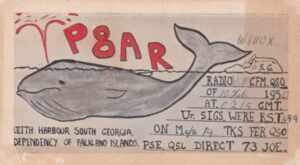 Thanks to Mehdi F5PFP for having shown an old QSL card of VP8AR who did operate from Leith Haurbour in 1950, WAP is happy to issue a reference number for this unreferenced Brithish station in the South Georgia islands.
Thanks to Mehdi F5PFP for having shown an old QSL card of VP8AR who did operate from Leith Haurbour in 1950, WAP is happy to issue a reference number for this unreferenced Brithish station in the South Georgia islands.
Leith Harbour, Britain’s abandoned whale hunting stations is now WAP GBR-41. The New reference will be add to WAP-WADA Directory on its next release (June 2021).
Between 1909 and 1965, the whaling station of Leith Harbour on South Georgia was one of the busiest whaling stations in the world, with more than 48,000 whales processed into oil for margarine, bone meal for fertiliser and other products. A film crew was granted access to the abandoned whaling stations, and a new BBC4 documentary shows the remains of whaling life, and the wildlife that is re-colonising Leith Harbour.
Leith Harbour whaling station and Stromness Bay, in South Georgia, is part of British overseas territory in the southern Atlantic Ocean. The station was established in 1909, and finally abandoned for good in 1965. It is now off-limits to visitors due to dangerous buildings and high levels of asbestos. At its peak Leith Harbour housed 500 men and was the biggest whaling station in the world. A steam-saw on the bone loft used for cutting up the skulls and spines of whales, which were boiled to extract oil. Up to 29 tonnes of oil could be extracted from each whale by putting its blubber, meat and bone through different industrial processes. In 1933, 37% of the fat in British margarines was from whales.  WAP has actually no evidence that, other than VP8AR in 1950 someone else did operate Ham Radio from there. So far, it looks like no one operated from Leith Harbour after this one. (Pic aside shows an aerial view of Leith harbour)
WAP has actually no evidence that, other than VP8AR in 1950 someone else did operate Ham Radio from there. So far, it looks like no one operated from Leith Harbour after this one. (Pic aside shows an aerial view of Leith harbour)
Read more and watch the nice pics to “The Guardian” site, to which we say Thanks and credit: https://www.theguardian.com/environment/gallery/2014/jun/10/britains-whale-hunters-in-pictures
Leith Harbour WAP GBR-41 was a whaling station on the northeast coast of South Georgia, established and operated from 1909 until 1965. It was the largest of seven whaling stations, situated near the mouth of Stromness Bay.
Read also: https://www.bbc.com/news/magazine-27734930?piano-modal

Merci à Mehdi F5PFP pour avoir montré une ancienne carte QSL de VP8AR qui fonctionnait depuis Leith Haurbour en 1950,
WAP est heureux de délivrer un numéro de référence pour cette station Brithish non référencée dans le South Georgia islands.
Leith Harbour, Les stations de chasse à la baleine abandonnées de la Grande-Bretagne sont maintenant WAP GBR-41. La nouvelle référence sera ajoutée à
WAP-WADA Directory sur sa prochaine version (juin 2021).
Entre 1909 et 1965, la station baleinière de Leith Harbour sur la Géorgie du Sud était l’une des stations de chasse à la baleine les plus fréquentées au monde, avec plus de 48000 baleines
transformé en huile pour margarine, farine d’os pour engrais et autres produits. Une équipe de tournage a eu accès aux stations de chasse abandonnées, et un nouveau documentaire de la BBC4 montre le
les vestiges de la vie baleinière et la faune qui recolonise Leith Harbour.
Leith Harbour La station baleinière et Stromness Bay, en Géorgie du Sud, fait partie du territoire britannique d’outre-mer dans le sud de l’océan Atlantique. La station a été créée
en 1909, et finalement abandonné définitivement en 1965. Il est désormais interdit aux visiteurs en raison des bâtiments dangereux et des niveaux élevés d’amiante. À son apogée, Leith Harbour abritait 500 hommes et
était la plus grande station de chasse à la baleine au monde. Une scie à vapeur sur le grenier à os utilisée pour couper les crânes et les épines des baleines, qui ont été bouillis pour en extraire l’huile. Jusqu’à 29 tonnes d’huile
pourrait être extrait de chaque baleine en soumettant sa graisse, sa viande et ses os à différents procédés industriels. En 1933, 37% des graisses des margarines britanniques provenaient
de baleines.  WAP n’a en fait aucune preuve que, à part VP8AR en 1950, quelqu’un d’autre a fait
WAP n’a en fait aucune preuve que, à part VP8AR en 1950, quelqu’un d’autre a fait
exploiter Ham Radio à partir de là. Jusqu’à présent, il semble que personne n’opère depuis Leith Harbour après celui-ci. ( La photo à côté montre une vue aérienne du port de Leith)
Lisez plus et regardez les belles photos sur le site «The Guardian», auquel nous disons Merci et crédit: https://www.theguardian.com/environment/gallery/2014/jun/10/britains-whale-hunters-in-pictures
Leith Harbour WAP GBR-41 était une station baleinière sur la côte nord-est de South Georgia, établi et exploité à partir de 1909
jusqu’en 1965. C’était la plus grande des sept stations de chasse à la baleine, située près de l’embouchure de la baie Stromness.
Lire aussi: https://www.bbc.com/news/magazine-27734930?
piano-modal
Info de la Source Publié * ICI
